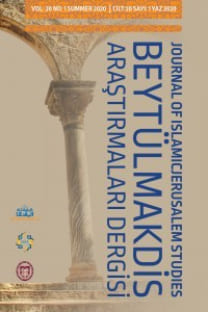Beytülmakdis Bereket Daireleri Teorisine göre Rusya'nın Suriye'deki Varlığı: Tartus Deniz Üssü
Tarih boyunca dünyanın her yerindeki Müslümanların temel meseleleri Kudüs ve Beytü'l-Makdis ile ilgili olmuştur. Dünyanın kontrolüne sahip olmak isteyen her devlet; Mescid-i Aksa'yı işgal etmeyi hedeflemiştir. Burası hemen hemen her süper gücün kontrol etmek istediği bir bölge olup, Rusya da bu süper güçlerden biri olmuştur. SSCB döneminden bu yana Rusya'nın Suriye'nin Akdeniz'deki önemli limanı olan Tartus'ta hedefleri olmuş ve bu hedefler Beytülmakdis bölgesi ile yakından bağlantılıdır. Bu çalışmada teorik olarak, Abd al-Fattah El Awaisi'nin (2013) Bereket Daireleri Teorisi’ne göre Beytülmakdis’in jeopolitik önemini Rusya'nın Suriye/Doğu Akdeniz'deki Tartus Deniz Üssü” örneği ile vurgulamaya çalışacağım. Bu çalışmada birincil ve ikincil verilerin toplanması için nitel araştırma yöntemi kullanılmıştır. Bu bağlamda Beytülmakdis Bereket Daireleri Teorisi, Rusya'nın Akdeniz'deki varlığına göre test edilmiştir.
Anahtar Kelimeler:
Beytülmakdis, Akdeniz, Suriye, Rusya, Tartus Limanı
The Presence of Russia in Syria according to the Barakah Circle Theory: The Tartus Naval Base
Throughout history, the central issue for Muslims all over the world relates to al-Quds and Bayt al-Maqdis. Any state that would like to have control of the globe has aimed to occupy Islamicjerusalem. This is a region that almost every superpower wants to control, and Russia has emerged as one such modern superpower. Since the time of the Soviet Union, it has had ambitions in Syria’s important port of Tartus on the coast of the Mediterranean Sea and these aims are closely connected with the Holy Land. This study aims to theoretically highlight the geopolitical importance of Bayt al-Maqdis according to the Barakah Circle Theory of El-Awaisi (2005) with a case study of Russia’s Naval Base in Tartus in the Eastern Mediterranean Sea. In this study, a qualitative research method is used to collect primary and secondary data. In this regard, Bayt al-Maqdis’s Barakah Circle Theory is tested according to the case study of Russia’s presence in the Mediterranean Sea.
Keywords:
Syria, Bayt al-Maqdis, Mediterranean Sea, Russia, Tartus Port,
___
Aslanlı, A. (2018). Rusya'nın Suriye Politikası. Ortadoğu Stratejik Araştırmalar Merkezi (ORSAM).Awad, A. (1986). Peace and Security in the Mediterranean. Al-SiyassaAl-Dawlya.
Awaisi, A. A.-F. (2016). Beytülmakdis Bereket Daireleri Teorisi. Pelikan Basım.
Awaisi, A. A. -F. (2007). Introducing Islamicjerusalem. Al-Maktoum Institute.
Dilek, M. S. (2017). Rusya Federasyonu- Suriye İlişkileri' nin Temelleri. Kastamonu Üniversitesi İktisadi ve İdari Bilimler Fakültesi Dergisi.
Fedyszyn, T. R. (2013). The Russian Army 'Rebalances' to the Mediterranean. U.S. Naval Institute: Retrieved from https://www.usni.org/magazines/proceedings/2013/december/russian-navy-rebalances-mediterranean
Garganus, J., & Rumer, E. (2019). Carnegie Endowment for International Peace: Retrieved from https://carnegieendowment.org/2019/02/20/russia-s-global-ambitions-in-perspective-pub-78067
MacFie, A. (1983). The Straits Question in the First World War, 1914-18. Middle Eastern Studies.
Rabbani, M. (2019). Jadaliyya. Geopolitical Dynamics and the Question of Palestine: Retrieved from https://www.jadaliyya.com/Details/40132
Saka, H. (2016). Yenişafak. Beytülmakdis demek hayatım demektir: Retrieved from https://www.yenisafak.com/gundem/beytulmakdis-demek-hayatim-demektir-2578384
Seçkin, A. (2013).Doğru Haber. Suriye'yi Önemli Kılan Nedir? : Retrieved from https://dogruhaber.com.tr/mobil/yazar/ahalim-seckin/2524-suriyeyi-onemli-kilan-nedir
Sputnik. (2015). Retrieved from https://tr.sputniknews.com/ortadogu/201503261014653529/
Sputnik. (2016). Retrieved from https://sputniknews.com/politics/201610111046207689-russian-base-syria-tartus/
Talha, M. M. (1990). The Strategic Importance of the Mediterranean. U.S. Army War College.
Yılmaz, S. (2016). Rusya Neden Suriye'de. Yazar Yayınları.
Zonova, T. (2015). Mediterranean Trend in Russia's Foreign Policy. Rivista Di Studi Politici Internazionali.
- ISSN: 1367-1936
- Yayın Aralığı: Yılda 2 Sayı
- Başlangıç: 1997
- Yayıncı: Beytülmakdis Çalışmaları Vakfı
Sayıdaki Diğer Makaleler
The Popular Role in Defending al-Aqsa Mosque: Ribat as a Model
Başkan Trump’ın İsrail-Filistin Çatışmasına Yönelik Küçümseme Körükleyen Politikası
Beytülmakdis Araştırmaları Dergisi: Çeyrek Yüzyıllık Bilgi Üretimi
Beytülmakdis Bereket Daireleri Teorisine göre Rusya'nın Suriye'deki Varlığı: Tartus Deniz Üssü
Beytülmakdis Bereket Daireleri Teorisine göre Rusya'nın Suriye'deki Varlığı: Tartus Deniz Üssü
Artukluların Beytülmakdis’teki Kültürel Bağlarının Pırıltıları
